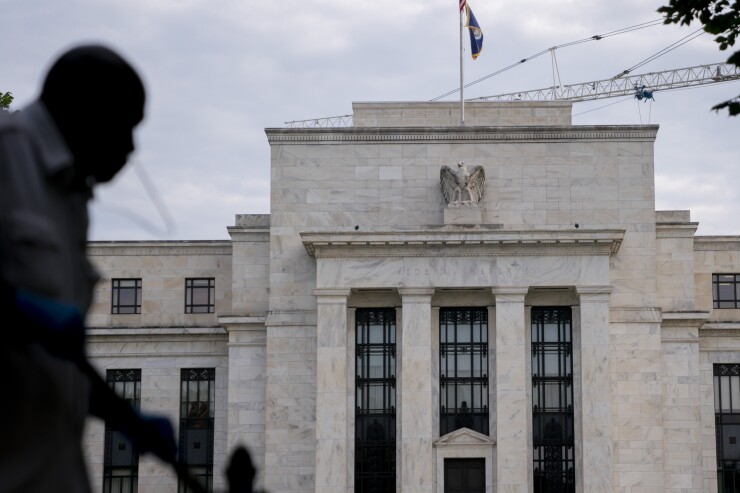WASHINGTON — The Federal Deposit Insurance Corp. Board voted unanimously to finalize a rule requiring banks to pay more for deposit insurance, despite industry objections.
In a 3-0 vote, the FDIC passed a rule to increase assessment rates 2 basis points beginning the first quarter of next year,
The FDIC estimates that the rate hike would reduce banks' income on average by 1.2%.

The agency's board also noted that it reserves flexibility to change assessment rates in the future without a notice or comment period.
It's also bad timing, banks argue, to raise deposit rates now as the U.S. potentially enters a recession, and a period of uncertainty for banks.
"The increase, set to take effect in the first quarter of next year, will reduce banks' lending capacity right when bank credit supply will be needed to support growth and help steer the economy into a soft landing rather than a recession, or to cushion the blow of a recession should one occur," the banks said in a press release ahead of the FDIC meeting.
House Republicans have even entered the fray. Led by Rep. Blaine Luetkemeyer of Missouri, a group of senior Republicans on the House Financial Service Committee wrote a letter dated Oct. 17 urging the board to let the fund recover over time, rather than raising rates.
"We are concerned that an increase in the assessment rate at this time could pose real harm to consumers, particularly those with low and moderate incomes who may need access to credit," the lawmakers said. "It is in their best interests to allow the fund to naturally recover over time as deposits run off."
The FDIC rejected those arguments.
At the meeting, FDIC board members said that the rate increase is still necessary, and that it's better to raise rates now while banks can withstand what they said is a modest effect on their businesses. Deposits also typically fall somewhat in the second quarter, agency officials said, so the most recent second-quarter data isn't necessarily indicative of deposit levels falling in a way that would allow the fund to recover.
"Overall, the banking industry continues to report strong earnings and is well positioned to absorb this modest increase in assessment rates," FDIC acting Chairman Martin Greenberg said during the meeting.
The change "should not impact lending or credit availability in any meaningful way," he said.
The FDIC also

Gruenberg said that these large banks are increasingly relying on uninsured deposits for funding, and that he'd like to explore options to wind down these banks that don't involve selling them to another institution.
Although the FDIC and Fed filed the joint ANPR, acting Comptroller of the Currency Michael Hsu has been
"Exploring the development of a rule that can ensure the resolvability of large, domestically systemic banks will promote financial stability by guarding against the rise of non-GSIBs that may become too big to fail, while enabling true competition amongst the largest banks," he said. "Regulators should not be forced to choose between financial stability and competition. We need to find a way to achieve both."
The FDIC also passed a proposal to clarify the role of the FDIC ombudsman in the supervisory appeals process, trying to address banker complaints that the exam process is unfair.
The proposal is part of a saga involving the "Office of Supervisory Appeals," a short-lived project from former FDIC Chair Jelena McWilliams that made it easier to appeal an unfavorable ranking from a bank examiner. Gruenberg voted against the creation of the office, and when he became acting chair he reinstated the Supervision Appeals Review Committee, which
Under the proposal, the FDIC would expand and clarify the role of the agency's ombudsman by adding them to the Supervision Appeals Review Committee as a nonvoting member and would monitor the supervision process after a bank submits an appeal. The proposal would also require that materials considered by the Supervision Appeals Review Committee be shared with both parties to the appeal and would allow banks to request a stay of a material supervisory determination while an appeal is pending.
Comments on the proposal are due 30 days after its publication in the Federal Register.





